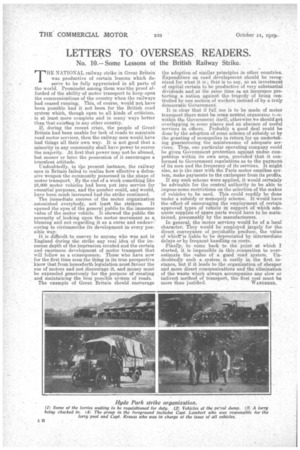LETTEkZS TO OVERSEAS READERS.
Page 14

If you've noticed an error in this article please click here to report it so we can fix it.
No. 10.— Some Lessons of the British Railway Strike.
THE NATIONAL railway strike in. Great Britain was productive of certain lessons which deserve to be hilly appreciated in all parts of the world. Prominent among them was the proof afforded of the ability of motor transport to keep open the communications of the country when the railways had ceased running. This, of course, would not have been. possible had it not been for the British road system which, though open to all kinds of criticism, is at least more complete and in many ways better than that existing in any other country.
If, during the recent crisis, the people of Great-Britain had been unable for lack of roads to maintain road motor services, then the railway men would have had things all their own way. It is not good that a. minority in any community shall have power to coerce the majority. At first that power may not be abused, but sooner or later. the possession of it encourages a truculent attitude.
-Undoubtedly, in tliepresent instance, the railway men in Britain failed to realize how effective a defensive weapon the community possessed in the shape of motor transport. By the end of a week something like 25,000 motor vehicles had been put into service for essential purposes, and the number could, and would, have been muoli increased had the strike continued.
The immediate success of the motor organization astonished everybody, not least the strikers. It opened the eyes of the general public to the immense value of the motor vehicle. It showed the public the necessity of looking upon the motor movement a,s a_ blessing and not regarding it as a curse and endeavouring to circumscribe its development in every pos sible way. • It is difficult to convey to anyone who was not in England during the strike any real idea of the immense depth of the impression created and the certain and enormous development of motor transport that will follow as a consequence. Those who have now for the first time seen the thing in its true perspective know that from henceforth legislation must favour the use of motors and not discourage it, and money must be expended genekously for the purpose of creating and maintaining the hest possible system of roads. The example of Great Britain should encourage the adoption of similar principles in other countries. Expenditure on read development should be 'recognized for what it is ; that is to say, as an investment of capital certain to be productive of very substantial dividends and at the same time as an insurance protecting a nation. against the tragedy of being controlled by one section of workers instead of by a truly democratic Government.
It is clear that if full, use is to be made of motor transport there must be some central organizing bc,o■ within the Government itself, otherwise we should get overlapping in some places and an absence of useful services in others. Probably a good deal could be done by the adoption of some scheme of subsidy or by the granting of monopolies in return for an undertaking guaranteeing the maintenance of adequate services. Thus, one particular operating company could be given Government protection against undue competition within its own area, provided that it conformed to Government regulations as to the payment of its men and the frequency of its services. It might also, as is the ease with the Paris motor omnibus system, make payments to the exchequer from its profits.
If any such scheme were applied, it would certainly ' be advisable for the central authority to be able to impose,some restrictions on the selection of the makes of vehicles to be used. This could readily be done under a subsidy or monopoly scheme. It would have the effect of encouraging the employment of certain approved types of vehicle in support of which adequate supplies of spare parts would have to be maintained, presumably by the manufacturers.
In general, the motor services would be of a local character. They would be employed largely for the direct conveyance of perishable produce, the value of which-is liable to be depreciated by intermediate delays or by frequent handling on route. Finally, to come back to the point at Which I started, it is impossible in this connection to overestimate the value of a good read system. Undoubtedly such a system is costly in the first instance, but if it leads to the organization of cheaper and more direct communications and the elimination of the waste which always accompanies any slow or indirect method of transport, the first cost must be more than justified. WANDERER.
























